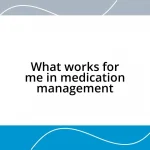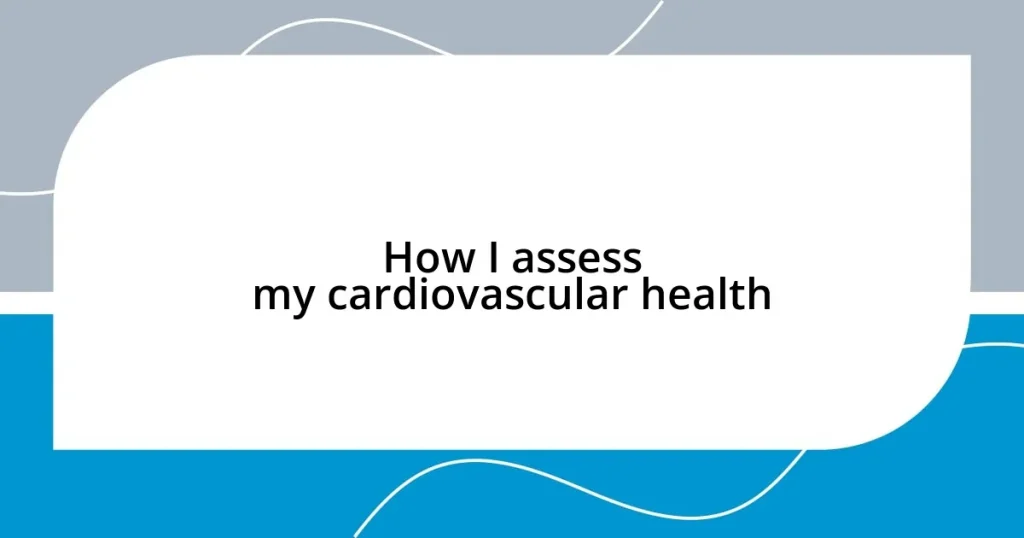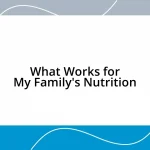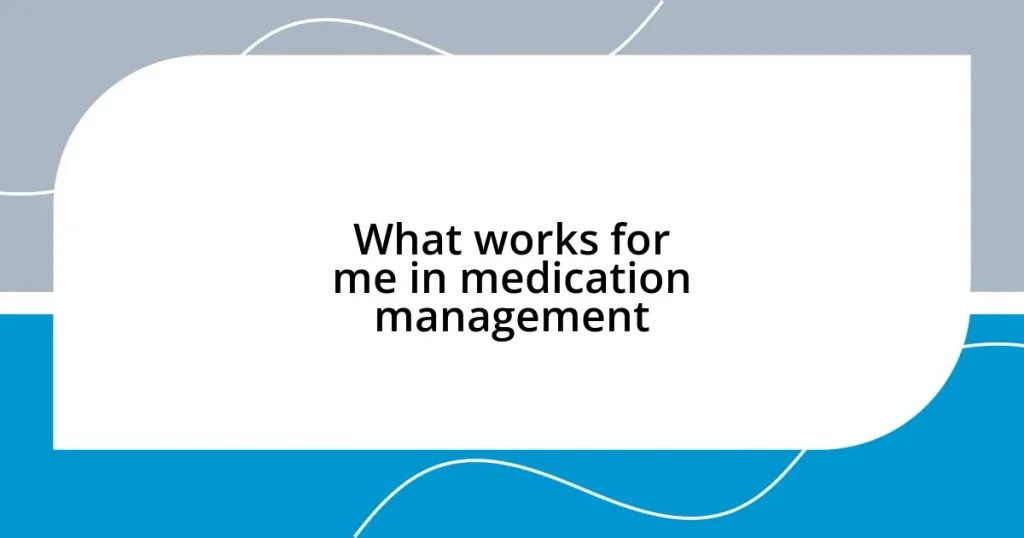Key takeaways:
- Understanding cardiovascular health involves recognizing the impact of lifestyle choices on heart function and overall well-being.
- Regular health assessments are crucial for early detection of issues, motivation for healthier choices, and building trust with healthcare providers.
- Key indicators of cardiovascular health include blood pressure, cholesterol levels, heart rate, BMI, and blood sugar levels.
- Lifestyle factors such as stress management, nutrition, and physical activity play significant roles in cardiovascular health, with small changes leading to substantial improvements.
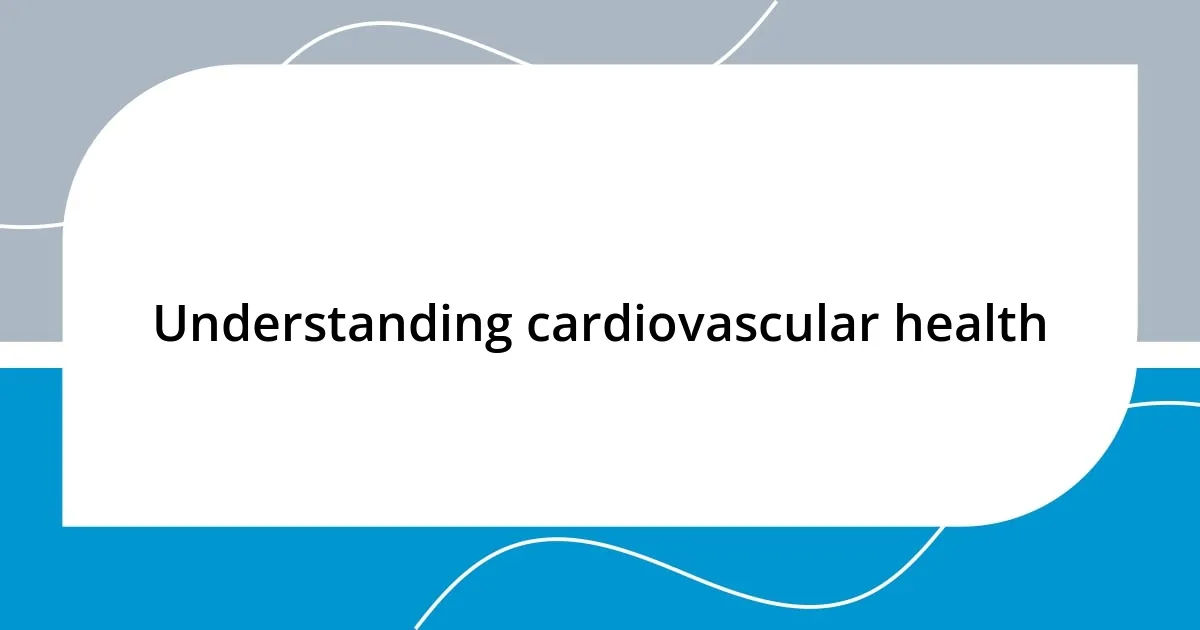
Understanding cardiovascular health
When I think about cardiovascular health, I often reflect on how the heart is not just an organ; it’s the engine that powers our life. It’s fascinating to realize that cardiovascular health involves more than just the heart—it’s about our entire circulatory system, including the blood vessels. Have you ever paused to consider how your daily choices impact your heart?
I remember a time when I became more aware of my own cardiovascular health after a friend’s unexpected heart scare. It was a wake-up call for me, highlighting the importance of understanding how factors like diet, exercise, and stress can play significant roles. It made me realize that I needed to actively assess my heart’s condition and make adjustments to my lifestyle—something I had taken for granted.
Understanding cardiovascular health also means recognizing the various markers that indicate how well my heart is functioning, such as blood pressure and cholesterol levels. These figures can be intimidating, but I find that breaking them down and setting personal health goals makes them feel more manageable. Isn’t it empowering to take charge of our health, knowing that small changes can lead to significant improvements in how we feel overall?
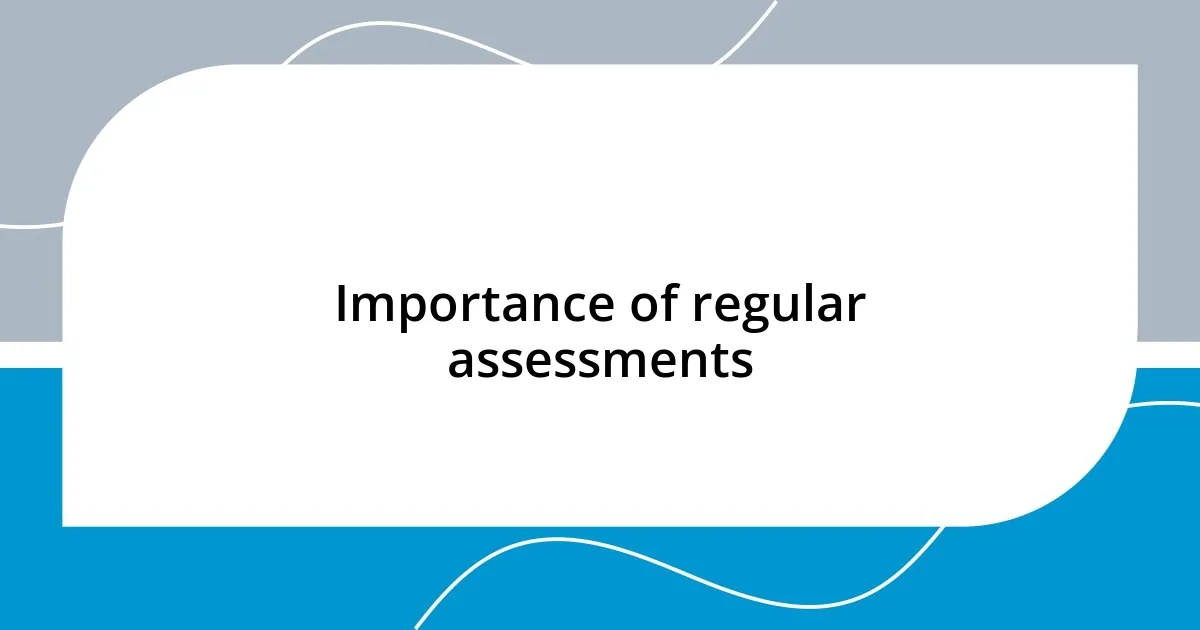
Importance of regular assessments
Regular assessments of cardiovascular health are crucial in identifying potential risks before they escalate. I once had a colleague whose routine check-up uncovered elevated cholesterol levels. This finding prompted her to change her diet and engage in consistent exercise, ultimately preventing a more serious health issue down the line. It’s a reminder to me that knowing where we stand can make a significant difference in our journey towards better health.
In my experience, these assessments serve as motivators. Tracking my heart health regularly encourages me to make lifestyle choices that align with my goals. For example, when I saw improvements in my blood pressure after adopting a heart-healthy diet, I felt a surge of pride and a compelling reason to continue. It’s incredible how data can fuel our determination and help us stave off conditions that may arise from neglecting our health.
The role of regular assessments extends beyond prevention; it builds a relationship of trust with healthcare providers. I appreciate the transparency that comes with discussing my health status during appointments. By sharing my journey and hearing professional insights, I feel empowered to take charge of my cardiovascular health more effectively. After all, a healthy heart leads to a healthier life, doesn’t it?
| Key Benefits of Regular Assessments | Examples |
|---|---|
| Early Detection | Identifying high blood pressure or cholesterol levels before they lead to heart disease |
| Motivation | Tracking progress over time can inspire healthier lifestyle choices |
| Trust and Communication | Building a supportive relationship with healthcare providers for better health management |
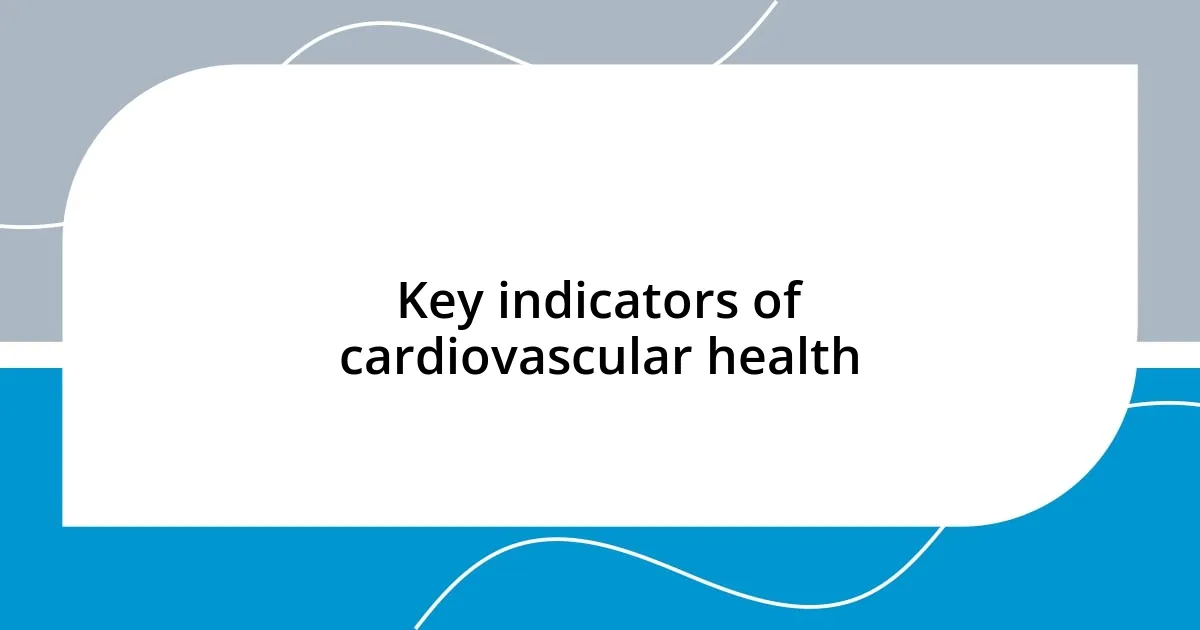
Key indicators of cardiovascular health
When I think about the key indicators of cardiovascular health, I find it useful to focus on measurable factors that paint a clearer picture of my heart’s condition. These markers aren’t just numbers—they represent the careful balance of my body’s systems, and watching them can feel like tuning an engine for optimal performance. I remember feeling a mix of relief and anxiety during my last check-up when I realized that my blood pressure had improved significantly. It was surprising how a few lifestyle tweaks could translate into such positive changes.
Here are a few key indicators I keep an eye on:
- Blood Pressure: Ideal levels are generally around 120/80 mmHg; high readings can signal increased strain on the heart.
- Cholesterol Levels: Maintaining a low LDL (bad) cholesterol while encouraging higher HDL (good) cholesterol is crucial for heart health.
- Heart Rate: A resting heart rate of 60-100 beats per minute is normal, with lower rates often indicating better cardiovascular fitness.
- Body Mass Index (BMI): Keeping this within the healthy range (18.5 to 24.9) helps reduce the risk of heart disease.
- Blood Sugar Levels: Monitoring these can help catch potential issues related to diabetes, which can significantly affect cardiovascular health.
I often reflect on how these indicators collectively guide my health journey—they’re like signposts along the road, reminding me to stay mindful of my choices. It’s almost comforting to have tangible metrics, making the abstract concept of cardiovascular health feel more concrete and attainable.
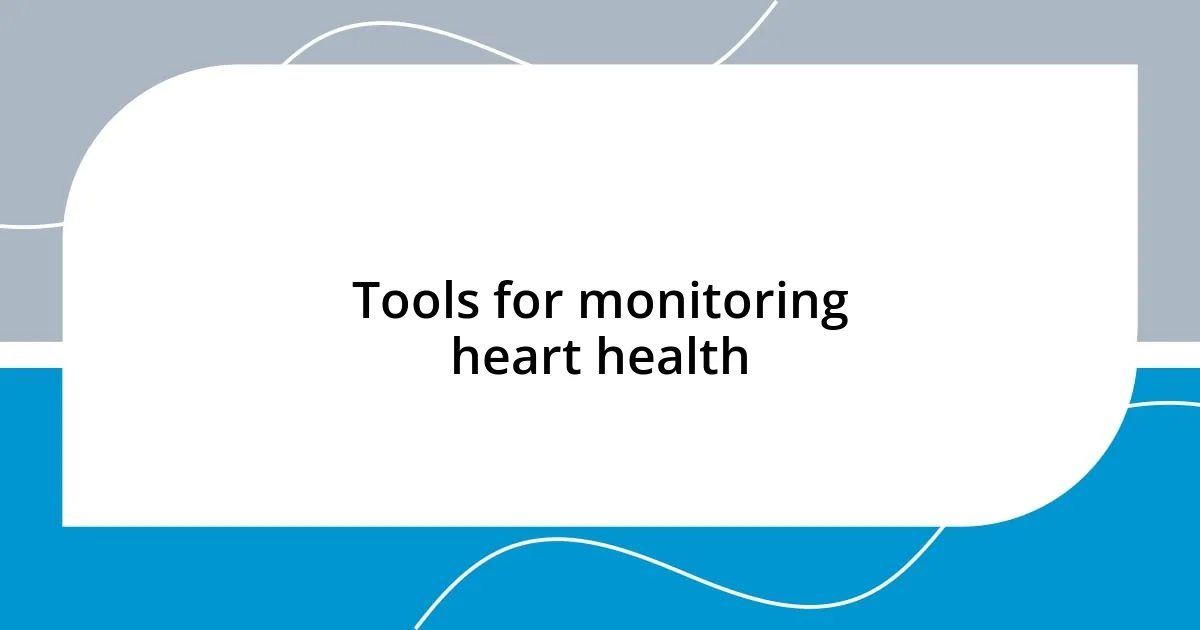
Tools for monitoring heart health
Monitoring heart health has become more accessible with various tools. One device I’ve found particularly valuable is a home blood pressure monitor. I vividly recall the first time I used one; it felt empowering to take charge of my own readings. No longer waiting for the annual check-up, I could track my blood pressure weekly and adjust my lifestyle accordingly. Have you ever thought about how much more informed you feel when you gather data regularly?
Another essential tool has been my fitness tracker. This little gadget does more than just count steps; it helps me monitor my heart rate during workouts. Just last month, I noticed my resting heart rate was steadily decreasing, a sign of improved fitness. It was an exciting moment, knowing that my efforts were paying off. I find it fascinating how technology can give us these insights and motivate us to keep pushing forward.
Additionally, I’ve come to appreciate the role of mobile health apps. They synthesize data from different sources, allowing me to see trends in my heart health over time. I remember logging my dietary changes and exercise habits, and it was eye-opening to visualise how these factors impacted my cholesterol levels. Do you think keeping a digital diary of your health could encourage more mindful choices? For me, it certainly has.
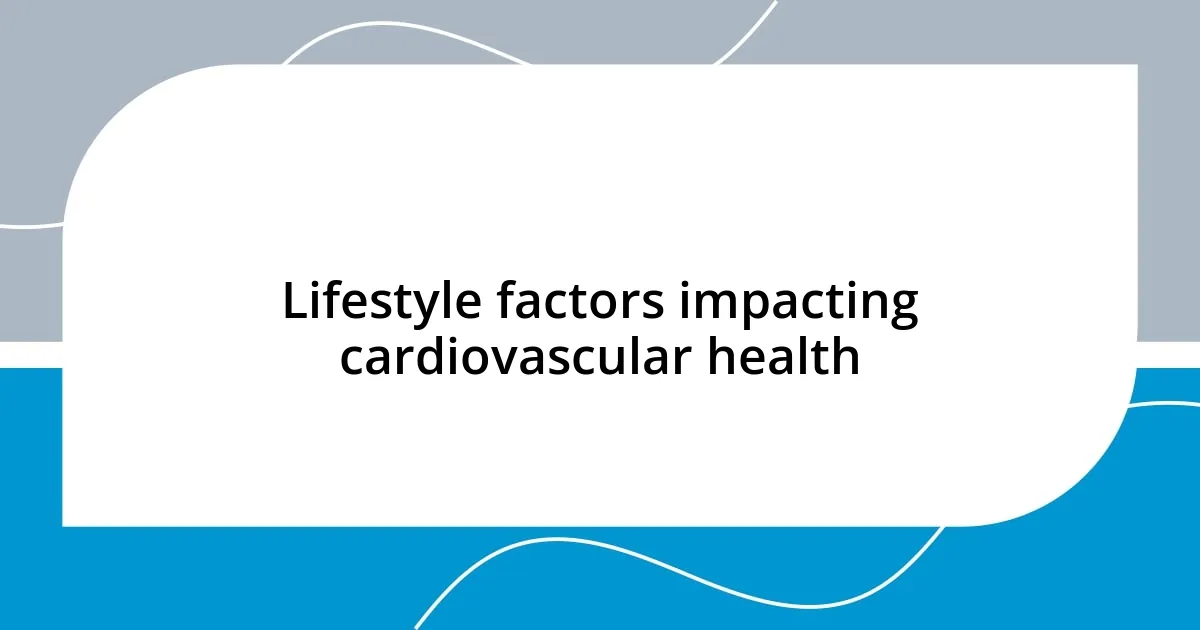
Lifestyle factors impacting cardiovascular health
When assessing my cardiovascular health, I’ve noticed how lifestyle factors directly influence various risk markers. For instance, my experience with stress management has been enlightening. I used to rush through my day, caffeine in hand, only to realize that chronic stress was skyrocketing my blood pressure. Once I committed to daily mindfulness practices, I found that both my mood and heart health improved markedly. Have you ever considered how something as simple as taking a moment to breathe can leave a lasting impact on your well-being?
Nutrition plays a pivotal role, too, and it wasn’t until I made some significant changes that I truly understood its power. I recall the day I decided to swap out processed snacks for fresh fruits and nuts. Not only did my energy levels soar, but I also noticed my cholesterol levels stabilizing during my next check-up. It’s astonishing to think that what I put on my plate can resonate so deeply within my body. Have you tried to observe the connection between meals and how you feel?
Physical activity is like the engine oil for my cardiovascular system. I have found that even a 30-minute walk can boost my heart’s performance. There was a time when I struggled to make exercise a priority, feeling overwhelmed by a busy schedule. Yet, when I committed to making fun activities—like cycling with friends—a regular part of my week, I felt my heart become stronger. It was a refreshing reminder that exercise doesn’t have to feel like a chore. What activities spark joy for you? Finding ways to enjoy movement can transform your approach to heart health.
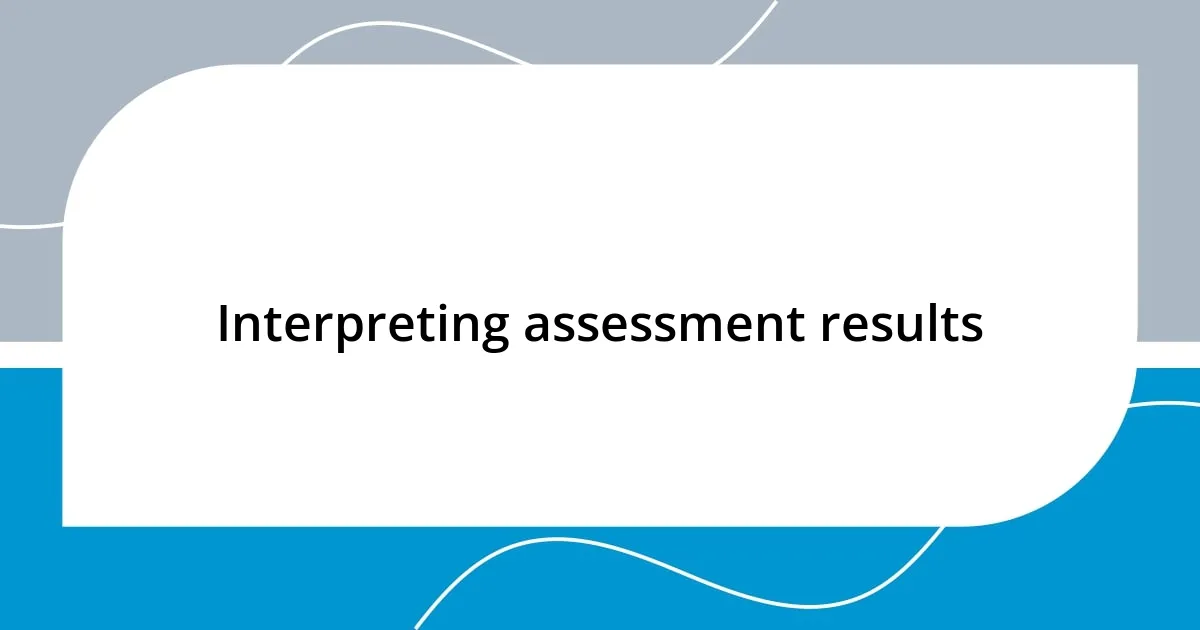
Interpreting assessment results
Interpreting assessment results can initially feel overwhelming, especially with numbers that seem complicated. I remember the first time I reviewed my cholesterol and blood pressure results; there was so much jargon! But over time, I learned to break it down. For instance, understanding that a total cholesterol level below 200 mg/dL is considered healthy has helped me feel more secure in my dietary choices. Have you ever found clarity in what seemed like a muddle of information?
When I dive into my cardiac assessment results, I pay close attention to trends rather than just individual numbers. I once noticed my blood pressure consistently creeping up, which prompted me to adopt more proactive measures, such as prioritizing my sleep. It was both alarming and enlightening; recognizing that my lifestyle played a direct role in my health transformed my outlook. Connecting the dots between my daily habits and these results is like piecing together a puzzle, revealing the bigger picture of my cardiovascular health.
I’ve also learned the value of consulting with healthcare professionals when interpreting these results. Taking my assessments to my doctor for analysis has been a game-changer; they’ve explained the nuances behind high-density lipoprotein (HDL) versus low-density lipoprotein (LDL) cholesterol. I can still recall the relief I felt when realizing that not all cholesterol is bad; understanding the differences made me feel more empowered to make informed choices. Have you considered how a conversation with an expert could deepen your understanding of your health data? I genuinely believe it’s about building a collaborative relationship with medical professionals for better heart health.
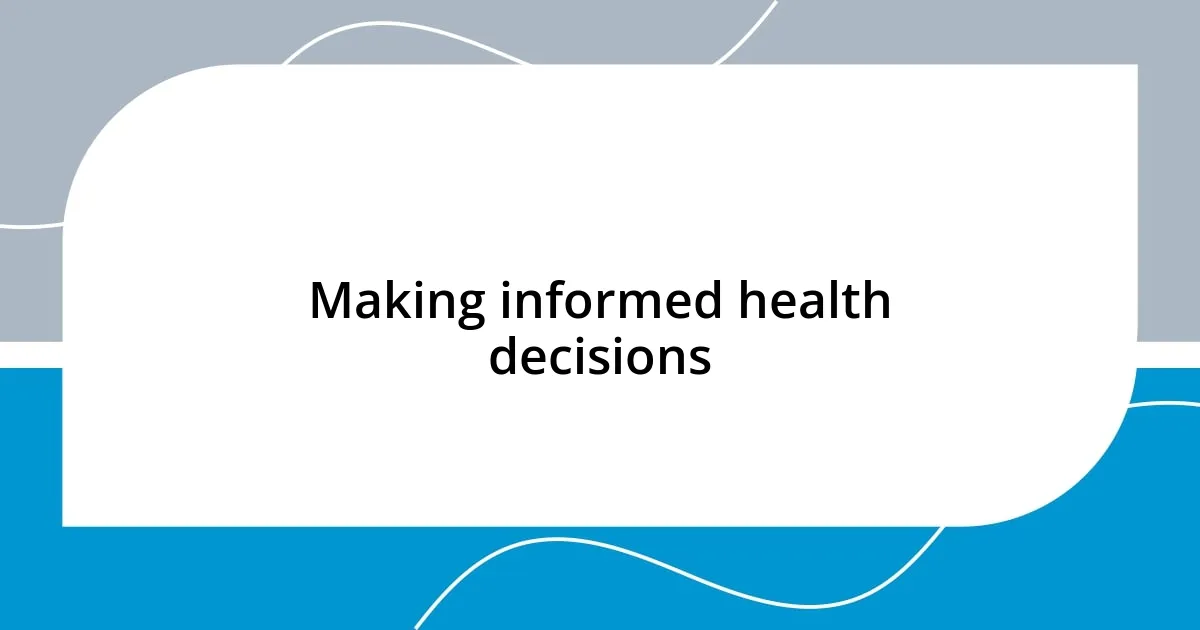
Making informed health decisions
When I think about making informed health decisions, I often reflect on my approach to gathering information. It was an eye-opening experience when I realized that countless resources are available—from medical journals to reputable websites—but the key is to know which ones to trust. For instance, I once followed a trendy diet, only to find that it didn’t align with my personal health needs. Have you ever felt misled by popular health fads?
Engaging in open dialogue with healthcare providers has been critical for me, too. I remember sitting down with my physician, feeling a mix of anxiety and curiosity as I asked questions about my lab results. That conversation helped demystify many aspects of my health, like how certain vitamins impacted my cardiovascular system. This interactive exchange not only alleviated my concerns but sparked a deeper interest in my overall wellness. How often do you take the time to discuss your health with your doctor?
I’ve also discovered the importance of continual self-education. I’ve made it a habit to read up on cardiovascular health regularly, even subscribing to health newsletters. One article about heart-healthy spices caught my attention, and now I can’t imagine cooking without turmeric! By staying informed, I empower myself to make choices that resonate with me personally and support my heart health in the long run. Have you found that learning more about health has changed the way you approach your own well-being?


